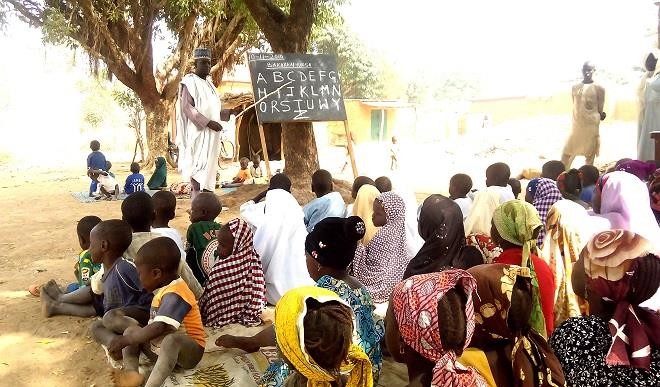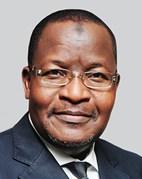For the past two years, 8-year-old Shafa’atu Haruna had nurtured a burning desire to attend school, but her village Shara – a typical rural community tucked deeply in Sumaila local government council of Kano State, does not have one.
The nearest primary school in the area is located in the neighbouring village of Matigwai which is more than five kilometers from Shara and separated by a rocky stream which overflows during the rains.
Respecting her determination to acquire formal education, Shafa’atu’s father, Muhammad Labiru Haruna, 35, agreed to enroll his daughter in the school after the rainy season in October last year. It was learnt that every morning, Shafa’atu would pick up her few books and pencil and trudge along a winding footpath, flanked by thick bushes, to attend her school, behind a mountain.
But her excitement, it was gathered, soon evaporated after the rains returned, flooding the only available route to the school and making it inaccessible even to adults. As a result, Shafa’atu was compelled to suspend her education and engage in house chores, hoping to return to school when the rains disappear and the stream dries up.
With over 500 children of school age, Shara – a farming community with a population of over 3,000 people, is one of many rural communities in Kano State, where children experience wasted childhood due to the absence of schools or difficulties accessing them.
Residents said for many years, the absence of a school in the community, coupled with the inability of pupils to easily access education elsewhere, has left them with no choice but to recruit their children into farming and other activities to assist the community.
Usman Saleh, a resident, told our reporter that once children in Shara attained the age of four, the boys accompany their fathers to the farms while the girls engage either in domestic chores or hawking food and other commodities within the community.
As soon as they reach adolescence, Saleh said the girls, who had by then generated enough money through years of hawking, would be married off at the age of 13 or 14 while the boys relocate to the cities where they take up menial jobs like hawking water in pushcarts or working in construction sites and factories.
It was learnt that though the residents appeared to have accepted this lifestyle which they believe helps them to make ends meet, the development actually threatens the community with a plethora of problems.
“The inability of our children to attend school is a problem that should not be taken lightly because presently, we are facing a backlash from early marriage as most of our girls are suffering from Vesico Vaginal Fistula (VVF), and maternal and child mortality,†said Saleh, one of the few educated residents advocating for a school in the area.
He added that within five months, three women were officially reported to have died as a result of child-birth related complications not to mention other unreported cases.
“Many pregnant women here do not go to the hospital for antenatal care and their husbands don’t allow them even if they want to. The men just ask them to use herbs. Most of the couples don’t even know how to manage their marriages. This is all because of ignorance,†he said.
According to the United Nations International Children’s Emergency Fund (UNICEF), “across much of South Asia and sub-Saharan Africa, children born to mothers with no education are three times more likely to die before they are five than those born to mothers with a secondary education. And girls from the poorest households are twice as likely to marry as children than girls from the wealthiest households.â€
Recently however, a light of fortune flickered on Shara Village when members of a Kano-based civil society organization, Centre for Information Technology and Development (CITAD), chose the community as one of the beneficiaries of a project, Mobilizing for Development (M4D), funded by the UK Department for International Development (DFID) to encourage school enrolment in Kano.
It was learnt that in September last year, CITAD with support from M4D conducted a campaign aimed at improving access to education through “strengthening community groups and informal institutions†in three rural local governments areas of Sumaila, Garun Malam and Dawakin Tofa.
According to a report by CITAD, four wards were selected for the project in each of the three local government councils and the choice of Sitti, where Shara community belongs, was made because of its extreme remoteness.
Although poor parents often lament the extra burdens education places on them such as buying books and uniforms for children apart from feeding them, our reporter learnt that residents of Shara welcomed the initiative to assist their community with a school, wholeheartedly.
An official of CITAD, Sagir Ado Abubakar, said that when the organization first entered the community, they took time to engage in vigorous house-to-house campaign on the importance of education before proposing to set up a school in the community where children can attend without difficulty.
“We were surprised that the people were so receptive to our advocacy that they readily volunteered a space that was formerly used as a mosque to set up a school for them. What we understood was that in the area of education, rural dwellers are not enlightened on the importance of community participation because they are usually thought to be ignorant and averse to change. This is wrong,†he said.
He said after a series of meeting with community leaders for some weeks, CITAD informed the state Ministry of Education as well as the State Universal Basic Education Board (SUBEB), who welcomed the idea and gave a green light for the takeoff of the community school.
On 19th of May this year, the community school came to life in Shara Village after an elaborate gathering of community members, CITAD and government officials who all pledged to ensure the success of the initiative.
Similarly, Saleh said following the inauguration of the school, residents convened a separate meeting where it was agreed that a large parcel of land should be provided for construction of a permanent primary school that can accommodate all the children in the area.
“We contributed money and bought a big farmland in an appropriate location to serve as the site for the construction of a permanent school in the area. We informed the government and they agreed to build the school,†he said.
But beneath the efforts and success of establishing a community school in Shara, Daily Trust on Saturday reports that dire challenges still lie as classes were being held in open space under a tree, with dust intermittently blown by women threshing millet nearby, which routinely interrupt classes.
Other ominous signs threatening the existence of the makeshift school range from absence of furniture and instructional materials, to the cold and dusty winds of harmattan which rob the school of pupils.
The head teacher, Malam Kabiru Umar, said that at inception, the school was recording a daily turnout of over 150 pupils, most of them girls, but “as a result of lack of classroom structure, that number is gradually shrinking.â€
He warned that if a structure was not erected to protect the pupils from harsh weather and temperatures, the school might be suspended until a more convenient and tolerable season comes.
“This will not be good because each time lessons are suspended, children normally forget what they learned and have to be taught the same thing over and over again. This slows their progress in education,†he said.
For Shafa’atu, the arrival of the community school meant everything to her as it has brought her dream to acquire education right to her doorstep.
As her father Haruna, spoke passionately about the need to ensure the survival of the school, Shafa’atu, undeterred by the challenges being discussed, listened to her teacher with keen interest amidst her two siblings Binyamin 6 and Idi, 5.
“We must work hard to nurture this school because it would serve as our children’s bridge to attain development. We have already grown up living a rural life but we don’t expect our children to experience the same. This is why the government should help us with a class structure,†Haruna said.
Similarly, the District Head of Sitti, Alhaji Saleh Yakubu, said that since residents of Shara have shown interest in educating their children by encouraging the establishment of a community school and even buying another land to build a large one, then the government should help build a decent school.
“We are begging the authorities concerned to consider our request for building a permanent modern school in Shara. Presently the children study outside in the cold and dust which threaten their health,†he said.
When contacted on phone, Idris Aliyu Rimi, the Education Secretary of the Local Education Authority (LEA) in Sumaila local government council, said the government has not forgotten about the Shara school project.
“You should tell the community members that we are aware of their plight. But as you know, education is a costly venture. There are no projects going on anywhere because there are no funds. So, let them allow their children to continue attending the community school since a teacher has been dispatched,†he said.
Rimi added however that a temporary structure would be erected immediately to provide shelter for the pupils during holiday in December.
But Umar S. Muhammad Kibiya, the Permanent Member 1 of SUBEB, who is familiar with the issue, told Daily Trust on Saturday that after locating Shara village with the help of CITAD, plans have already been concluded to build a classroom there in 2017.
“When we visited Shara about five months ago, we understood that the village has certain population of children that require a school. The village lacks a school because of a river or valley that prevents children from attending schools (elsewhere) especially during the rainy season.
“On our return, I reported the issue to the executive chairman and he directed the Director of Physical Planning and the Director, Planning and Statistics to include Shara village in our action plan for 2017 to build a classroom to accommodate the children. By 2017, Shara would enjoy a classroom by God’s grace,†he said.
Read more at http://www.dailytrust.com.ng/news/feature/shara-kano-community-without-school-gets-education-lifeline/174333.html











